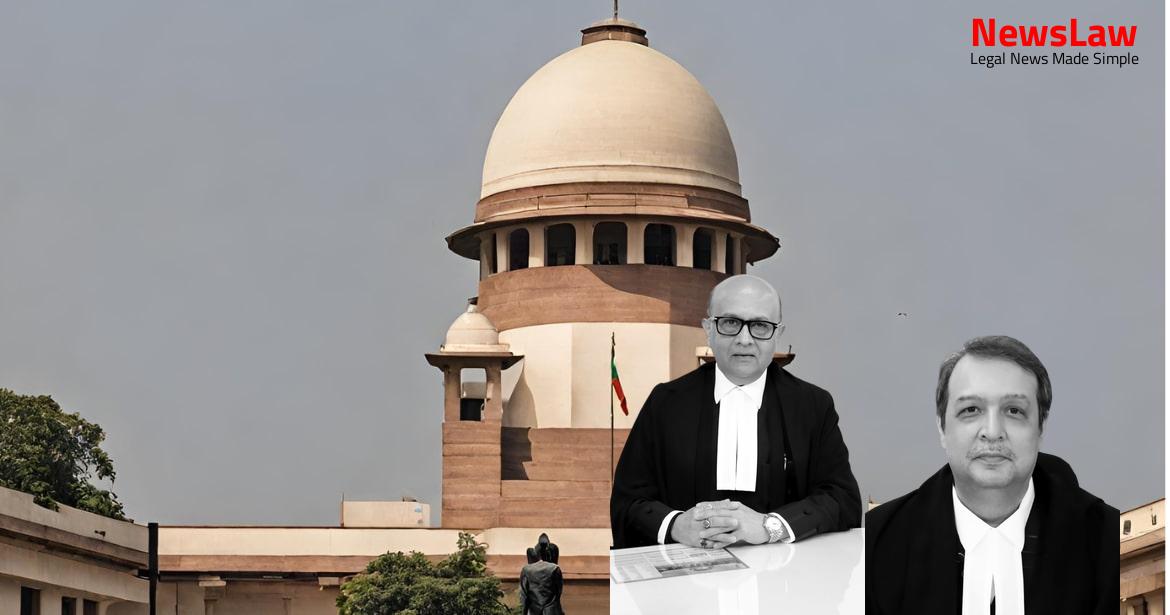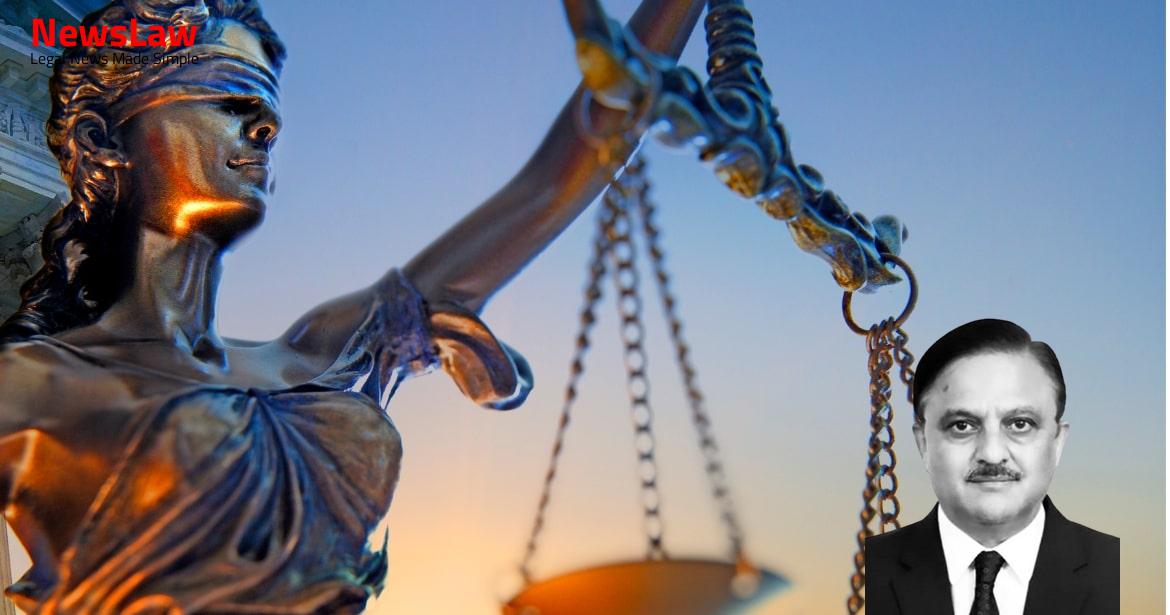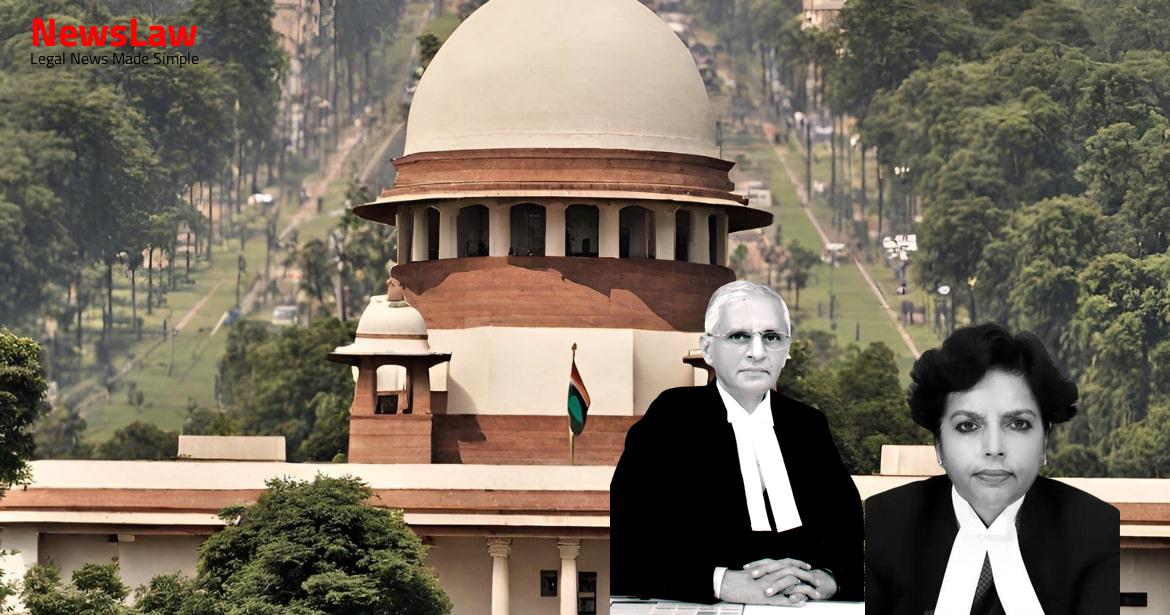In the legal battle between Fertilizer Corp. of India Ltd. and M/s Hindustan Polymers, the Supreme Court of India delivered a significant judgment. The case delves into the complexities of company liabilities and the interpretation of statutory provisions. Let’s delve deeper into the details of this case and its implications on the legal landscape.
Facts
- The original defendants stated before the trial court that they had been declared a sick company under Section 3(1)(o) of the 1985 Act.
- The original plaintiff claimed losses due to the original defendants’ refusal to accept 25,000 bags after placing an order, resulting in selling the bags as scrap.
- The original plaintiff instituted a civil suit to recover Rs. 8,27,100.74/- along with interest amounting to Rs. 10,31,803.14/- up to the date of filing the suit.
- The original defendants required HDPE bags for packaging fertilizers and had been placing orders with the original plaintiff since 1986-87.
- The purchase orders were amended to accommodate the increase in bag quantity required by the original defendants.
- The trial court ruled in favor of the original plaintiff after considering the specific pleadings and issues framed during the proceedings.
- Both parties appealed the trial court’s decision to the High Court.
- Original plaintiff argued against deductions for liquidated damages and penalty, seeking interest at 24% under the 1993 Act.
- Original defendants claimed trial court failed to consider evidence properly and wrongly awarded amounts to the plaintiff.
- High Court allowed deductions for liquidated damages to defendants but granted amounts deducted for penalty, price difference, and loss to the plaintiff.
- High Court granted 24% compound interest on amounts due after considering 20 years of developments.
- BIFR declared M/s Fertilizer Corpn. of India as not a Sick Industrial Company.
- High Court limited the liability of original defendants to pay interest from the date of the impugned judgment.
- High Court awarded interest at 24% based on the SBI floor rate for the financial year 1993-94.
- High Court partly allowed both appeals modifying the trial court’s decree.
- Defendant company remained a Sick Industrial company with BIFR Special Director during the suit adjudication and part of the appeals.
- CCEA made decisions on defendant company’s revival on 09.05.2013.
Also Read: Railway Freight Charges Dispute: Hindustan Petroleum v. Indian Railways
Issue
- Plaintiff entitled to interest at 12% p.a. from 01.01.1994 till realization
- Defendants regularized supply of 33,000 bags at Rs. 8.46/bag via P.O. No 40893 dated 21.04.1994 accepted by plaintiff
- Plaintiff printed 25,000 bags as per oral order of defendants
- Plaintiff sustained 50% loss due to defendants’ refusal to take delivery of bags, awarded Rs 1,18,000/- with Civil Appeal Nos. 5366-5367 of 2024
- Defendants entitled to deduct Rs. 4,89,919.99 as penalty in accordance with terms and conditions
- Plaintiff entitled to interest for delayed payment as per law
- Suit not maintainable despite defendants being declared as Sick Industry by BIFR
- Defendants cannot deny agreed price for 42,000 bags after consuming them without placing an order
Also Read: Nenavath Ravi vs. State of Telangana: Preventive Detention Order Quashed
Arguments
- The original defendants relied on certain cases, but the petitioner argues that those cases do not apply to the present situation.
- The High Court’s interference with the trial court’s decision to award 12% pendente lite interest in favor of the petitioner is considered to be erroneous.
- In the current case, both the existence and quantum of liability are in dispute, unlike previous cases.
- The petitioner contests the classification of deductions made by the original defendants as delayed payment for the purpose of interest computation under the 1993 Act.
- The petitioner asserts that the adjudicatory process of making an award is not barred under Section 22 of the 1985 Act.
- The petitioner argues that the civil court had inherent jurisdiction to decide the suit under Section 9 of the Civil Procedure Code, therefore not barred by Section 22 of the Act.
- The original defendants did not refer to the petitioner as a ‘creditor’ before any forum.
- The petitioner argues that Section 22 of the 1985 Act does not apply to the current case as their debt was not acknowledged and their name was not listed before the BIFR.
- The petitioner contends that approaching the civil court for a suit for recovery of money, despite the jurisdictional bar under Section 22, has consequences.
- The petitioner opposes the original defendants’ assertion that the 1985 Act overrides the 1993 Act.
- The High Court considered the issue of rate of interest under Section 4 of the 1993 Act.
- The High Court referred to the floor rate charged by the SBI for the financial year 1993-1994, which was 19% as per the Handbook of Statistics of Indian Economy by the RBI.
- The High Court’s judgement on the interest issue was based on relevant material and after hearing both parties.
- The original defendants are aggrieved by the award of 24% interest to the original plaintiff, claiming it inflated the principal decretal amount excessively.
- The defendant sought to rely on three judgments to argue that permission under Section 22 is essential: (i) Managing Director, Bhoruka Textiles Ltd. v. Kashmiri Rice Industries (2009) 7 SCC 521, (ii) Tata Davy Ltd. v. State of Orissa (1997) 6 SCC 669, and (iii) Dr. B.K. Modi v. Morgan Securities and Credits Pvt. Ltd.
- Contrary to the defendant’s claims about its financial status, the net worth of the defendant company as of 31.03.2022 is positive and estimated to be at least 2,000 crores.
Also Read: Legal Analysis on Abetment of Suicide
Analysis
- The interpretation of Section 22(1) of the Sick Industrial Companies (Special Provisions) Act, 1985 is crucial in determining the suspension of legal proceedings against sick industrial companies.
- The applicability of Section 22(1) depends on the specific facts of each case and whether the legal proceedings interfere with the formulation, consideration, finalization, or implementation of a rehabilitation scheme.
- The suspension of legal proceedings under Section 22(1) is temporary and aims to protect the assets of the sick company during the formulation and implementation of a rehabilitation scheme.
- The provision of Section 22(1) cannot be applied universally and must be considered in conjunction with the circumstances of each case.
- Courts have held that legal proceedings that impact the assets or functioning of a sick company should be suspended under Section 22(1) of the 1985 Act.
- The suspension of legal proceedings under Section 22(1) does not equate to the continuation of interest accruing on the principal decretal amount awarded by a civil court.
- The application of Section 22(1) of the 1985 Act must be in alignment with the overarching objective of the Act to revive and rehabilitate sick industrial companies.
- Section 3 of the 1993 Act outlines the liability of the buyer to make payment to small-scale industries.
- Sections 4 and 5 of the 1993 Act define the date from which and the rate at which interest is payable respectively.
- Section 15 of the 1985 Act enables the Board of Directors of a sick company to refer to BIFR for determining measures to be adopted.
- Section 22(1) of the 1985 Act suspends legal proceedings against a sick industrial company under specified conditions.
- Section 16 of the 1985 Act empowers the Board to make an inquiry to determine if a company is a sick industrial company.
- The definitions of important terms like ‘appointed day’, ‘buyer’, and ‘supplier’ are provided in section 2 of the 1993 Act.
- Defendant no. 2 relied on judgments stating that permission is needed under Section 22 of SICA for sick companies.
- The judgments cited do not address the proposition in the later Raheja Universal case by a Division Bench of three Judges of the Supreme Court.
- The period when FCIL was declared as a sick company under the 1985 Act until its discharge by BIFR is excluded from the interest provision of the 1993 Act.
- The suit brought by the original plaintiff before the trial court was not affected by Section 22(1) of the 1985 Act.
Decision
- Pending applications will be disposed of.
- The final amount determined in accordance with the final decree must be paid to the original plaintiff within 4 weeks.
- Interest at the rate of 36% p.a. with monthly compounding will accrue if the payment is not made within the stipulated time.
- The decree awarded in favor of the original plaintiff is valid.
- The High Court’s decision to award 24% interest to the original plaintiff is upheld.
- Interest will be calculated at 24% p.a. with monthly compounding, excluding the period when the defendant company was considered a sick company under the 1985 Act.
- Parties will bear their own costs.
Case Title: FERTILIZER CORPORATION OF INDIA LTD. Vs. M/S. COROMANDAL SACKS PRIVATE LIMITED (2024 INSC 348)
Case Number: C.A. No.-005366-005367 / 2024



